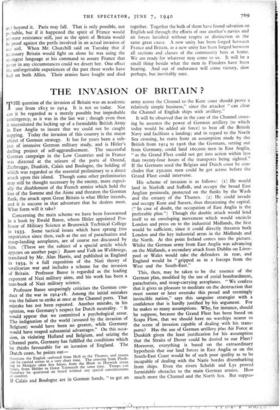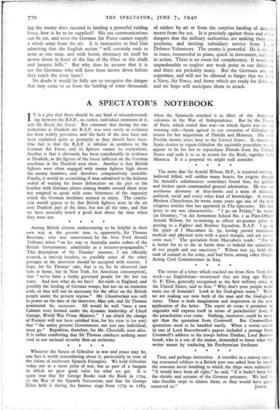THE INVASION OF BRITAIN ?
THE question of the invasion of Britain was an academic one from 1815 to 1914. It is not so today. Nor can it be regarded as a merely possible but improbable contingency, as it was in the last war ; though even then it necessitated the locking up of a formidable British Army in East Anglia to insure that we could not be caught napping. Today the invasion of this country is the major object of German strategy. It has for years been a sub- ject of intensive German military study, and is Hitler's darling project of self-aggrandisement. The successful German campaign in the Low Countries and in France was directed at the seizure of the ports of Ostend, Zeebrugge, Dunkirk, Calais and Boulogne, the holding of which was regarded as the essential preliminary to a direct attack upon this island. Though some other preliminaries may still be thought necessary by the enemy, more especi- ally the disablement of the French armies which hold the line of the Somme and the Aisne and threaten the German flank, the attack upon Great Britain is what Hitler intends, and it is success in that adventure that he desires most. What form will it take?
Concerning the main scheme we have been forewarned in a book by Ewald Banse, whom Hitler appointed Pro- fessor of Military Science at Brunswick Technical College in 1933. Some tactical issues which have sprung into importance since then, such as the use of parachutists and troop-landing aeroplanes, are of course not discussed by him. (These are the subject of a special article which appears on another page.) Raum and Volk im Weltkriege, translated by Mr. Alan Harris, and published in England in 1934, is a full exposition of the Nazi theory of totalitarian war and includes a scheme for the invasion of Britain. Professor Banse is regarded as the leading exponent of Nazi military aims, and his work has been a text-book of Nazi military science.
Professor Banse unsparingly criticises the German con- duct of the war in 1914-18. Among the initial mistakes was the failure to strike at once at the Channel ports. That mistake has not been repeated. Another mistake, in his opinion, was Germany's respect for Dutch neutrality. " It would appear that we committed a psychological error. The indignation of the world (aroused by the invasion of Belgium) would have been no greater, while Germany would have reaped substantial advantages." On this occa- sion, in violating Holland and Belgium, and seizing the Channel ports, Germany has fulfilled the conditions which he thinks favourable for an invasion of England. The Dutch coast, he points out—
threatens the English seaboard from Hull to the Thames, and troops can be carried across in a very short time. The crossing from Flush- ing to Margate takes five hours, from the Hook to Harwich seven hours, from Helder to Great Yarmouth the same time. Troops can therefore be quartered on board without any special considerations of comfort.
If Calais and Boulogne are in German hands, " to get an army across the Channel to the Kent coast should prove a relatively simple business," since the attacker " can clear the Channel of English ships with artillery."
It will be observed that in the case of the Channel cross- ing he assumes the power of German artillery (to which today would be added air force) to beat off the British Navy and facilitate a landing; and in regard to the North Sea crossing, he starts from an assumption made by the British from 1914 to 1916 that the Germans, setting out from Germany, could land I6o,000 men in East Anglia, " as the Grand Fleet could not get into action within less than twenty-four hours of the transports being sighted." If the Germans used the Belgian and Dutch coast he con- cludes that 25o,000 men could be got across before the Grand Fleet could intervene.
His scheme of invasion is as follows: (I) He would land in Norfolk and Suffolk, and occupy the broad East Anglian peninsula, protected on the flanks by the Wash and the estuary of the Thames. (2) He could invade and occupy Kent and Sussex, thus threatening the capital. (" In case of doubt, the occupation of East Anglia is the preferable plan.") Though the double attack would lend itself to an enveloping movement which would encircle London and press on to the industrial Midlands, the first would be sufficient, since it could directly threaten both London and the key industrial areas in the Midlands and the North. At this point Ireland comes into the picture. Whilst the German army from East Anglia was advancing on the Midlands, a secondary attack from Dublin on Liver- pool or Wales would take the defenders in rear, and England would be " gripped as in a forceps from the West and the South-East."
This, then, may be taken to be the essence of the German plan, modified by the use of aerial bombardment, parachutists, and troop-carrying aeroplanes. " We confess that it gives us pleasure to meditate on the destruction that must sooner or later overtake this proud and seemingly invincible nation," says this sanguine strategist with a confidence that is hardly justified by his argument. For he makes so many assumptions. Why, for instance, should he suppose, because the Grand Fleet has been based on Scapa Flow, that we should have no warships nearer to the scene of invasion capable of dealing with his trans- ports? Has the use of German artillery plus Air Force at Dunkirk given the least justification for his assumption that the Straits of Dover could be denied to our Fleet? Moreover, everything is based on the extraordinary hypothesis that our land forces in East Anglia or on the South-East Coast would be of such poor quality as to be incapable of dealing with the Nazis hordes disembarking from ships. Even the rivers Scheldt and Lys proved formidable obstacles to the main German armies. How much more the Channel and the North Sea. But suppos- ing the enemy does succeed in landing a powerful raiding force, how is he to be supplied? His sea communications can be cut, and even the German Air Force cannot supply a whole army from the air. It is instructive to find him admitting that the English nation " will certainly rush to arms as one man, and with heroic obstinacy let itself be mown down in front of the line of the Ouse or the chalk and jurassic hills." But why does he assume that it is not the Germans who will have been mown down before they reach the river lines?
No doubt it would be folly not to recognise the danger that may come to us from the landing of some thousands of raiders by air or from the surprise landing of det, ments from the sea. It is precisely against these and o. dangers that the military authorities are making their positions, and inviting subsidiary service from L Defence Volunteers. The enemy is powerful. He is sk: in ruses, resourceful in plans, quick in movement, rut: in action. There is no room for complacency. It woult. unpardonable to neglect any weak point in our defer. and there are probably many. But the Germans are supermen, and will not be allowed to forget that we I-, a Navy, Air Force, and Army which are ready for defer and we hope will anticipate them in attack.



































 Previous page
Previous page